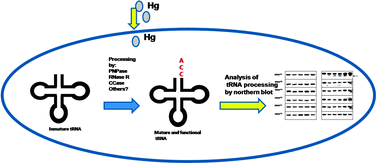RNA processing is an essential pathway in the regulation of genetic expression in the cell. In this work, Bacillus subtilis was used to understand the effects of mercury on the mechanism of tRNA metabolism. The CVAAS (cold vapor atomic absorption spectroscopy) method revealed that from the addition of HgCl2 (0.75 μg ml−1) during the bacterial exponential phase, ca. 48% of the added mercury was taken up by the cells. This led to an immediate reduction in the rate of cell division. During this response, we observed accumulation of species shorter than mature tRNACys over a 10 h period. We did not observe this accumulation for another five tRNAs analyzed. tRNA processing is largely dependent on RNase R and PNPase in B. subtilis. Thus, when the exonuclease PNPase was absent, we found that the shorter tRNACys species increased and mature tRNACys decreased after mercury addition, but this proportion changed during the time analyzed. However, in the absence of RNase R and PNPase the accumulation of the shorter tRNACys was more pronounced and the mature form was not recovered. In the single rnr mutant strain the shorter tRNACys was not observed. All together, we provide in vivo evidence that PNPase and RNase R are indispensable in controlling tRNACys quality in the presence of mercury.

You have access to this article
 Please wait while we load your content...
Something went wrong. Try again?
Please wait while we load your content...
Something went wrong. Try again?


 Please wait while we load your content...
Please wait while we load your content...